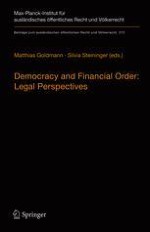2018 | OriginalPaper | Chapter
An Alert from the Left: The Endangered Connection Between Taxes and Solidarity at the Local and Global Levels
Author : Francisco Saffie G.
Published in: Democracy and Financial Order: Legal Perspectives
Publisher: Springer Berlin Heidelberg
Activate our intelligent search to find suitable subject content or patents.
Select sections of text to find matching patents with Artificial Intelligence. powered by
Select sections of text to find additional relevant content using AI-assisted search. powered by
